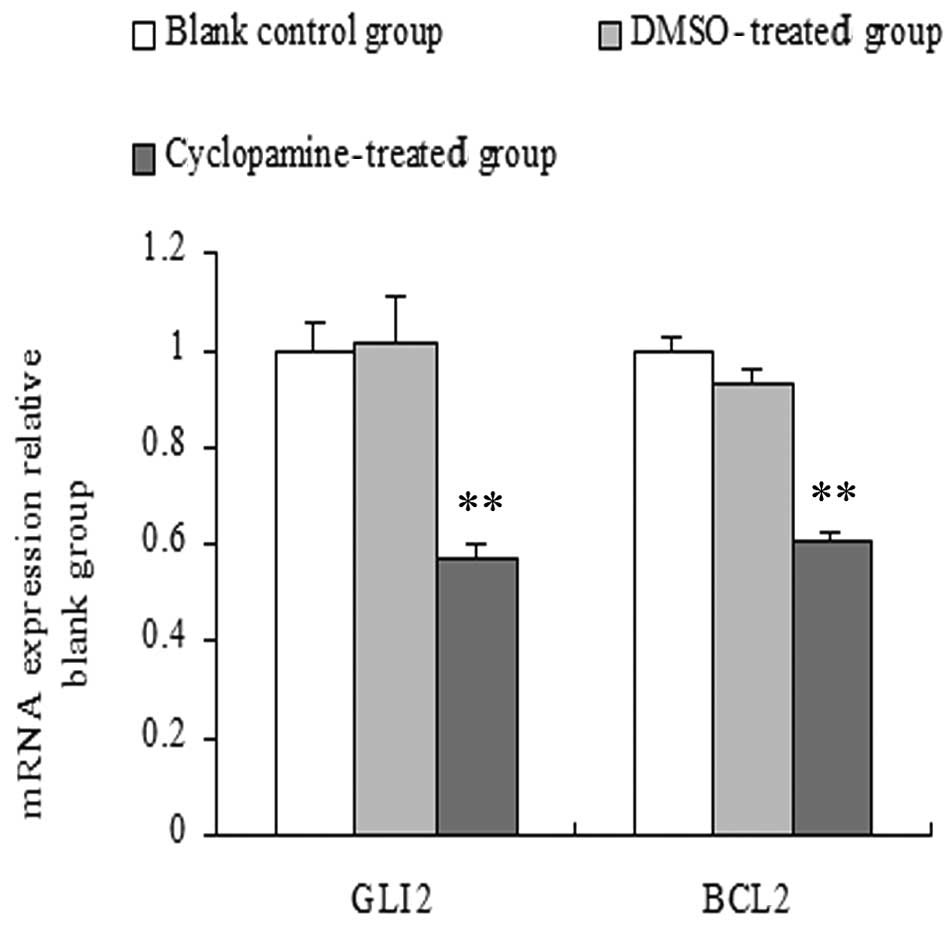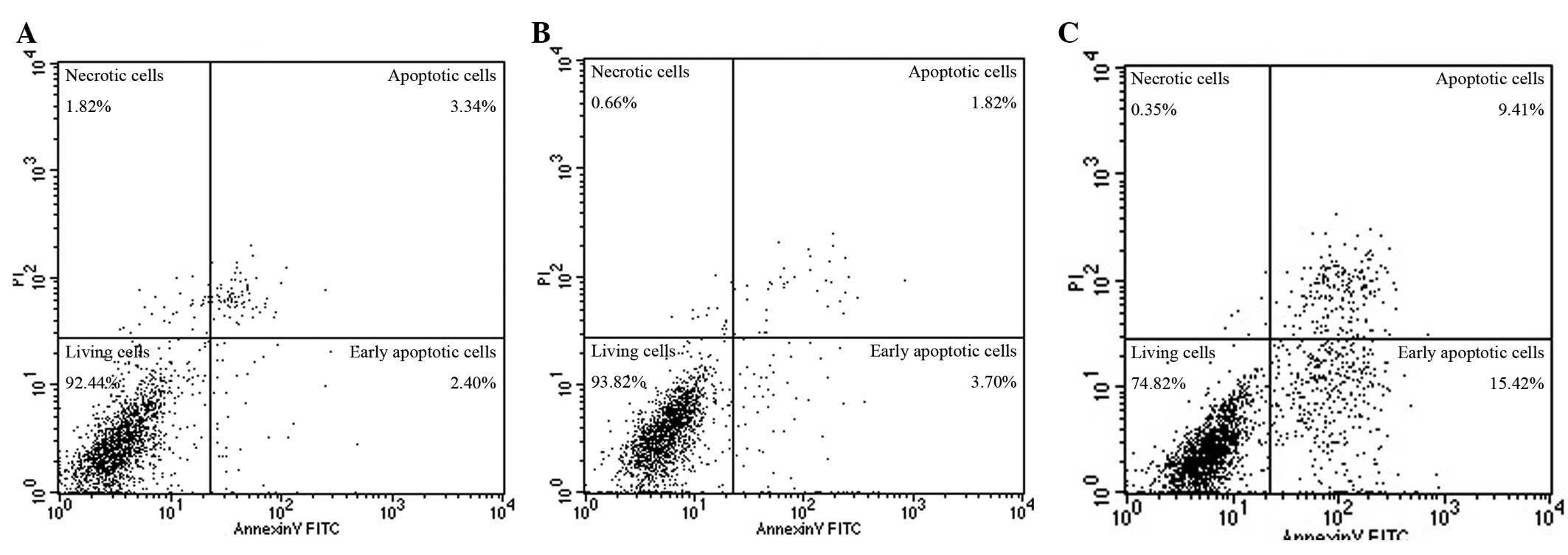|
1
|
Song M, Xiao C, Wang T, et al: Study of
the differentially expressed genes in pleomorphic adenoma using
cDNA micro-arrays. Pathol Oncol Res. 17:765–769. 2011. View Article : Google Scholar : PubMed/NCBI
|
|
2
|
Kelleher FC, Cain JE, Healy JM, et al:
Prevailing importance of the hedgehog signaling pathway and the
potenial for treatment advancement in sarcoma. Pharmacol Ther.
136:153–168. 2012. View Article : Google Scholar : PubMed/NCBI
|
|
3
|
Mimeault M, Moore E, Moniaux N, et al:
Cytotoxic effects induced by a combination of cyclopamine and
gefitinib, the selective hedgehog and epidermal growth factor
receptor signaling inhibitors, in prostate cancer cells. Int J
Cancer. 118:1022–1031. 2006. View Article : Google Scholar
|
|
4
|
Pasca di Magliano M and Hebrok M: Hedgehog
signalling in cancer formation and maintenance. Nat Rev Cancer.
3:903–911. 2003.PubMed/NCBI
|
|
5
|
Marini KD, Payne BJ, Watkins DN and
Martelotto LG: Mechanisms of Hedgehog signaling in cancer. Growth
Factors. 29:221–234. 2011. View Article : Google Scholar : PubMed/NCBI
|
|
6
|
Paiva KB, Silva-Valenzuela MD, Massironi
SM, et al: Differential Shh, Bmp and Wnt gene expressions during
craniofacial development in mice. Acta Histochem. 112:508–517.
2010. View Article : Google Scholar : PubMed/NCBI
|
|
7
|
Shi I, Hashemi Sadraei N, Duan ZH and Shi
T: Aberrant signaling pathways in squamous cell lung carcinoma.
Cancer Inform. 10:273–285. 2011. View Article : Google Scholar : PubMed/NCBI
|
|
8
|
Min TH, Kriebel M, Hou S and Pera EM: The
dual regulator Sufu integrates Hedgehog and Wnt signals in the
early Xenopus embryo. Dev Biol. 358:262–276. 2011.
View Article : Google Scholar : PubMed/NCBI
|
|
9
|
Thiyagarajan S, Bhatia N, Reagan-Shaw S,
et al: Role of GLI2 transcription factor in growth and
tumorigenicity of prostate cells. Cancer Res. 67:10642–10646. 2007.
View Article : Google Scholar : PubMed/NCBI
|
|
10
|
Iannolo G, Conticello C, Memeo L and De
Maria R: Apoptosis in normal and cancer stem cells. Crit Rev Oncol
Hematol. 66:42–51. 2008. View Article : Google Scholar : PubMed/NCBI
|
|
11
|
Qiao L and Wong BC: Targeting apoptosis as
an approach for gastrointestinal cancer therapy. Drug Resist Updat.
12:55–64. 2009. View Article : Google Scholar : PubMed/NCBI
|
|
12
|
Chen XL, Cao LQ, She MR, et al: Gli-1
siRNA induced apoptosis in Huh7 cells. World J Gastroenterol.
14:582–589. 2008. View Article : Google Scholar : PubMed/NCBI
|
|
13
|
Regl G, Kasper M, Schnidar H, et al:
Activation of the BCL2 promoter in response to Hedgehog/GLI signal
transduction is predominantly mediated by GLI2. Cancer Res.
64:7724–7731. 2004. View Article : Google Scholar : PubMed/NCBI
|
|
14
|
Bar EE, Chaudhry A, Farah MH and Eberhart
CG: Hedgehog signaling promotes medulloblastoma survival via Bc/II.
Am J Pathol. 170:347–355. 2007. View Article : Google Scholar : PubMed/NCBI
|
|
15
|
Bigelow RL, Chari NS, Unden AB, et al:
Transcriptional regulation of Bcl-2 mediated by the sonic hedgehog
signaling pathway through gli-1. J Biol Chem. 279:1197–1205. 2004.
View Article : Google Scholar : PubMed/NCBI
|
|
16
|
Katoh Y and Katoh M: Hedgehog target
genes: mechanisms of carcinogenesis induced by aberrant hedgehog
signaling activation. Curr Mol Med. 9:873–886. 2009. View Article : Google Scholar : PubMed/NCBI
|
|
17
|
Chen XL, Cheng QY, She MR, et al:
Expression of sonic hedgehog signaling components in hepatocellular
carcinoma and cyclopamine-induced apoptosis through Bcl-2
downregulation in vitro. Arch Med Res. 41:315–323. 2010. View Article : Google Scholar : PubMed/NCBI
|
|
18
|
Mo W, Xu X, Xu L, et al: Resveratrol
inhibits proliferation and induces apoptosis through the hedgehog
signaling pathway in pancreatic cancer cell. Pancreatology.
11:601–609. 2012. View Article : Google Scholar : PubMed/NCBI
|
|
19
|
Farooqi AA, Mukhtar S, Riaz AM, et al: Wnt
and SHH in prostate cancer: trouble mongers occupy the TRAIL
towards apoptosis. Cell Prolif. 44:508–515. 2011. View Article : Google Scholar : PubMed/NCBI
|
|
20
|
Mazumdar T, DeVecchio J, Shi T, et al:
Hedgehog signaling drives cellular survival in human colon
carcinoma cells. Cancer Res. 71:1092–1102. 2011. View Article : Google Scholar : PubMed/NCBI
|
|
21
|
Han ME, Lee YS, Baek SY, et al: Hedgehog
signaling regulates the survival of gastric cancer cells by
regulating the expression of Bcl-2. Int J Mol Sci. 10:3033–3043.
2009. View Article : Google Scholar : PubMed/NCBI
|
|
22
|
McCall TD, Pedone CA and Fults DW:
Apoptosis suppression by somatic cell transfer of Bcl-2 promotes
Sonic hedgehog-dependent medulloblastoma formation in mice. Cancer
Res. 67:5179–5185. 2007. View Article : Google Scholar : PubMed/NCBI
|
|
23
|
Kurita S, Mott JL, Cazanava SC, et al:
Hedgehog inhibition promotes a switch from Type II to Type I cell
death receptor signaling in cancer cells. PLoS One. 6:e183302011.
View Article : Google Scholar : PubMed/NCBI
|

















